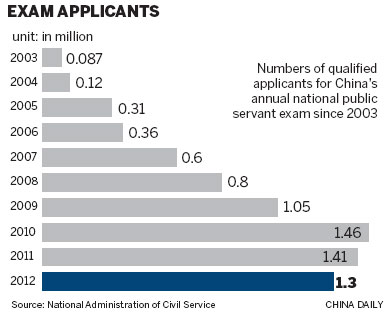Odd or difficult requirements make some potential applicants think twice
The country's annual civil service recruitment program, which began accepting applications on Monday, will offer more grassroots vacancies next year, including many positions with tough requirements.
More than 140 State-level government agencies, affiliated public institutions and local branches aim to recruit about 20,800 people in 2013, nearly 3,000 more than this year.
|
 |
A record-high 2 million people are expected to register for the national civil servant examination in November, Xinhua News Agency reported. The exam tests candidates' abilities and aptitude, and includes interviews.
As of 4 pm on Monday, 6,229 people had applied for 12.6 percent of the posts offered, according to the State Administration of Civil Service. The deadline for applying is Oct 24.
While many university graduates flock to big cities for jobs, the recruitment program continues to encourage new graduates to apply for grassroots positions by offering more vacancies at lower levels of government.
A job in the civil service is often nicknamed the "iron rice bowl" or "golden rice bowl" because many people believe it is a stable career, it carries a number of benefits and is believed to be comparatively easy.
But many positions offered next year do not appear that easy.
For example, seven posts provided by the Communist Party of China Central Commission for Discipline Inspection require a great deal of business travel. Three positions offered by the Party School of the CPC Central Committee require staff to work night shifts.
The Office of State Flood Control and Drought Relief Headquarters provides a job that requires frequent visits to emergency rescue and disaster relief sites, and is described as "bitter and more suitable for a man".
|
What does that mean? Requirements for certain posts at the national public servant exam have prompted discussion among applicants. Shao Junyi, an expert in the public servant exam with Huatu Education, explains the implied meaning of the requirements. Requirement: understanding local dialects As China has a complicated dialect system, this is a very practical requirement. Usually, those posts requiring understanding of dialects involve grassroots work, which needs contact with the common people. Requirement: a minimum five years of service Many employers require a minimum service because in previous years, some candidates quit the job within the probation period. To prevent this, the 2013 exam regulates that public servants who work less than two years in relevant posts are prohibited from taking the exam again. Requirement: subject to secondary allocation of posts This requirement appears in many posts for maritime and customs departments. Usually jobs after secondary allocation are not as good as first choices for applicants. As many posts within the maritime and customs department have harsh working conditions, applicants need to be mentally prepared for that. China Daily - Henan Business Daily |
Some jobs offered by the State Oceanic Administration ask workers to frequently go to sea and require overtime during holidays.
The taxation and customs departments, the two major job providers in the civil service recruitment, are offering many positions in places such as poverty-stricken counties and underdeveloped areas. A post provided by State Administration of Taxation's office in Jiangsu province clearly notes workers will need to work in rural areas, and "conditions at workplaces are tough".
Beijing customs authorities offer eight positions that require applicants to be in good physical condition and work in 24-hour shifts. Many customs authorities in other places also describe their jobs as intense work.
Wang Yun, who works at a consulting firm in Beijing, plans to take the civil servant exam this year.
"Everybody knows civil service jobs are easy and stable and need no overtime," the 28-year-old said. "My current job imposes a heavy workload. Although many civil service positions provided this time have many so-called tough conditions, I still believe those jobs would be easier than many other jobs."
Wang said he will probably shy away from posts with "tough requirements" and apply for an "easy" position.
Huang Song is a student of Chinese literature at a university in Xiamen, Fujian province, and will graduate in June. The 21-year-old said he plans to apply for a civil service position related to his major.
"I don't care how harsh a civil service job would be because I believe I could not avoid working round-the-clock or making frequent business trips if I take an ordinary job at an enterprise," he said. "I think an easy job is unnecessarily suitable for me because busy work can better prove my value."
In fact, some civil servants say their work is not as easy as many people believe.
Zhang Di became a civil servant in Chongqing two years ago and works as a secretary for a government body, which Zhang said she was not authorized to reveal to the media.
"After I took the job, I found the work is not as easy as I imagined," she said, adding that she has to collect a lot of material and write reports every day.
"Sometimes I'm so busy that I don't have time to eat meals. I often work until midnight and I have to work during holidays sometimes," she said.
Liu Xutao, a professor with the Chinese Academy of Governance in Beijing, said that civil service recruitment has been inclined to offer grassroots positions.
"Many grassroots civil service jobs are tough, and the detailed description about those positions can help applicants better understand the work," he said.
Liu said grassroots jobs are suitable for university graduates because they provide a good place to accumulate grassroots working experience.
Liu also noted that central authorities are attaching more importance to candidates' grassroots working experience when considering promoting officials. "There's a growing trend that officials with grassroots experience can get a quicker promotion," he said.
Yang Lina in Xiamen, Fujian province, contributed to this story.
chenxin1@chinadaily.com.cn
